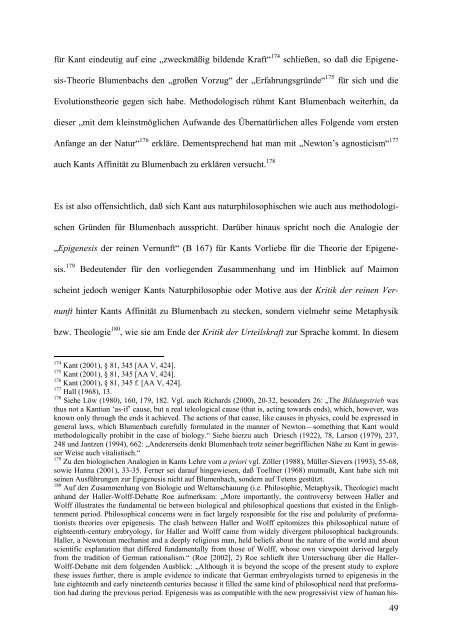Weltseele und unendlicher Verstand - Salomon Maimon
Weltseele und unendlicher Verstand - Salomon Maimon
Weltseele und unendlicher Verstand - Salomon Maimon
Erfolgreiche ePaper selbst erstellen
Machen Sie aus Ihren PDF Publikationen ein blätterbares Flipbook mit unserer einzigartigen Google optimierten e-Paper Software.
für Kant eindeutig auf eine „zweckmäßig bildende Kraft“ 174 schließen, so daß die Epigene-<br />
sis-Theorie Blumenbachs den „großen Vorzug“ der „Erfahrungsgründe“ 175 für sich <strong>und</strong> die<br />
Evolutionstheorie gegen sich habe. Methodologisch rühmt Kant Blumenbach weiterhin, da<br />
dieser „mit dem kleinstmöglichen Aufwande des Übernatürlichen alles Folgende vom ersten<br />
Anfange an der Natur“ 176 erkläre. Dementsprechend hat man mit „Newton’s agnosticism“ 177<br />
auch Kants Affinität zu Blumenbach zu erklären versucht. 178<br />
Es ist also offensichtlich, daß sich Kant aus naturphilosophischen wie auch aus methodologi-<br />
schen Gründen für Blumenbach ausspricht. Darüber hinaus spricht noch die Analogie der<br />
„Epigenesis der reinen Vernunft“ (B 167) für Kants Vorliebe für die Theorie der Epigene-<br />
sis. 179 Bedeutender für den vorliegenden Zusammenhang <strong>und</strong> im Hinblick auf <strong>Maimon</strong><br />
scheint jedoch weniger Kants Naturphilosophie oder Motive aus der Kritik der reinen Ver-<br />
nunft hinter Kants Affinität zu Blumenbach zu stecken, sondern vielmehr seine Metaphysik<br />
bzw. Theologie 180 , wie sie am Ende der Kritik der Urteilskraft zur Sprache kommt. In diesem<br />
174 Kant (2001), § 81, 345 [AA V, 424].<br />
175 Kant (2001), § 81, 345 [AA V, 424].<br />
176 Kant (2001), § 81, 345 f. [AA V, 424].<br />
177 Hall (1968), 13.<br />
178 Siehe Löw (1980), 160, 179, 182. Vgl. auch Richards (2000), 20-32, besonders 26: „The Bildungstrieb was<br />
thus not a Kantian ‘as-if’ cause, but a real teleological cause (that is, acting towards ends), which, however, was<br />
known only through the ends it achieved. The actions of that cause, like causes in physics, could be expressed in<br />
general laws, which Blumenbach carefully formulated in the manner of Newton—something that Kant would<br />
methodologically prohibit in the case of biology.“ Siehe hierzu auch Driesch (1922), 78, Larson (1979), 237,<br />
248 <strong>und</strong> Jantzen (1994), 662: „Andererseits denkt Blumenbach trotz seiner begrifflichen Nähe zu Kant in gewisser<br />
Weise auch vitalistisch.“<br />
179 Zu den biologischen Analogien in Kants Lehre vom a priori vgl. Zöller (1988), Müller-Sievers (1993), 55-68,<br />
sowie Hanna (2001), 33-35. Ferner sei darauf hingewiesen, daß Toellner (1968) mutmaßt, Kant habe sich mit<br />
seinen Ausführungen zur Epigenesis nicht auf Blumenbach, sondern auf Tetens gestützt.<br />
180 Auf den Zusammenhang von Biologie <strong>und</strong> Weltanschauung (i.e. Philosophie, Metaphysik, Theologie) macht<br />
anhand der Haller-Wolff-Debatte Roe aufmerksam: „More importantly, the controversy between Haller and<br />
Wolff illustrates the f<strong>und</strong>amental tie between biological and philosophical questions that existed in the Enlightenment<br />
period. Philosophical concerns were in fact largely responsible for the rise and polularity of preformationists<br />
theories over epigenesis. The clash between Haller and Wolff epitomizes this philosophical nature of<br />
eighteenth-century embryology, for Haller and Wolff came from widely divergent philosophical backgro<strong>und</strong>s.<br />
Haller, a Newtonian mechanist and a deeply religious man, held beliefs about the nature of the world and about<br />
scientific explanation that differed f<strong>und</strong>amentally from those of Wolff, whose own viewpoint derived largely<br />
from the tradition of German rationalism.“ (Roe [2002], 2) Roe schließt ihre Untersuchung über die Haller-<br />
Wolff-Debatte mit dem folgenden Ausblick: „Although it is beyond the scope of the present study to explore<br />
these issues further, there is ample evidence to indicate that German embryologists turned to epigenesis in the<br />
late eighteenth and early nineteenth centuries because it filled the same kind of philosophical need that preformation<br />
had during the previous period. Epigenesis was as compatible with the new progressivist view of human his-<br />
49


